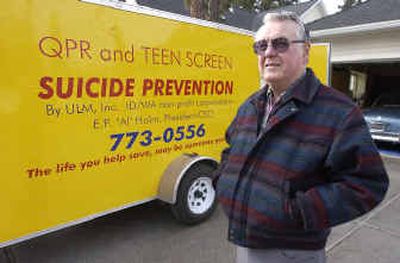Post Falls man’s program helps raise suicide awareness

Al Holm of Post Falls is hitting the streets to help prevent suicide in North Idaho.
As chaplain for the Post Falls and Coeur d’Alene police departments, Holm would often be called on to serve death notices. The toughest part of his job, he said, was seeing suicides and bearing the news to family members.
“It’s the most preventable death there is,” he said.
After he retired, he decided to do something about the suicide problem by starting a nonprofit suicide prevention and awareness program called Heartbeat.
Holm started studying suicide in 1994 through the QPR Institute in Spokane. The institute teaches people how to prevent suicide by questioning people at risk, persuading them from suicide and referring them to get help.
Kootenai County averages one suicide every 14 days, Holm said. In addition, he estimates about 500 attempts or gestures toward suicide are made each year. Holm said Idaho has the second-highest teenage suicide rate in the nation, and the North Idaho rate is more than double the national average.
In an effort to raise awareness about the problem, Holm is selling kettle corn out of a bright yellow trailer he parks at Wal-Mart or Tidyman’s in Post Falls. He’s invested about $10,000 to get the program running and plans to start applying for grants to keep it going without additional cost.
“The more we can make people aware of the problem, the easier it is to get something done,” he said.
Holm sells bags of popcorn for a suggested donation of $3 and $5, depending on size. He said the trailer has been well received, and many donate to remember siblings, relatives or friends.
In addition to spreading the word, Holm offers suicide-prevention resources, such as the same QPR training he received before starting the kettle corn stand. He can instruct classes and is working on keeping a steady class schedule.
He’s also offering to school districts in the region a mental health program called Teen Screen, which is designed to determine teens at risk of suicide. Holm said he learned as a chaplain and minister how to talk people out of committing suicide. But for the average person, he said, the biggest hurdle is the fear of saying something wrong that could make the situation worse.
What often results is nothing being said at all.
“The difficult part is getting over this idea that talking about it is going to cause the problem,” he said.
Instead, he follows the QPR guidelines to discover people at risk and confront them by asking if they’ve thought of hurting themselves or considered suicide.
“Once you start asking that question, boy, they just open up,” he said. “They’re looking for help.”
The approach is direct, but it works, he said. Once those at risk are spotted, they can be referred to and treated by counselors in the area.
Holm started Heartbeat a year ago with Terry Schroeder, clinical director of the program. Schroeder was also trained in QPR and has worked with suicide for 20 years. He said suicide rates in the area won’t drop with one or two interventions.
“It’s something we both know you can’t fix overnight,” Schroeder said. “It takes an entire community investing time and energy and money.”
Holm is working on spreading awareness of the problem and how to spot it. He’s approaching school districts, police and Aging and Adult Services about taking the QPR classes. He said the program has seen already seen a few positive results; he taught the course at Seltice Elementary School about three months ago, and officials have already spotted a 10-year-old who is at risk, he said.
Between arranging classes, Holm is planning to attend Relay for Life, the balloon festival and July Amsh powwow. He plans to devote all his time to the program and hopes to start a survivor support group.
For more information, contact (208) 773-0556